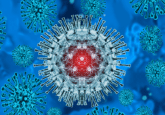Losing control of HIV: KLF2 could trigger impaired T-cell function

‘Controller’ patients naturally suppress HIV infection, but in some patients increased KLF2 expression and impaired T-cell function triggers T cells to abort natural HIV control.
A research group from the Ragon Institute of Massachusetts General Hospital (MA, USA) has uncovered new stages preceding the loss of natural HIV control in a small group of ‘controller’ patients. The study, led by first author David Collins, investigated how some controller patients who naturally suppress HIV infection later lose this ability, identifying elevated KLF2 expression and subsequent T-cell impairment as preceding causes. These findings provide insight into the immune interaction with HIV and may help develop new HIV treatments and vaccines.
Most HIV-positive patients are known as ‘progressors’ as their T cells become rapidly desensitized to the HIV antigens presented on infected cells and quickly lose the battle against the virus: a process known as T-cell exhaustion. However, in a small group of HIV-positive patients known as ‘controllers,’ their cytotoxic T cells are effective in recognizing HIV antigens and targeting infected cells for destruction, keeping the virus at bay. Controllers may successfully suppress HIV for many years before their T cells suddenly abort mission and lose control.
The study enrolled 17 subjects with durable HIV control and 17 with aborted control and investigated several factors – antigen presentation, HIV mutation, T-cell function – as potential reasons for controllers’ immune systems aborting control.
 Novel HIV vaccine shows lasting potential in non-human primates
Novel HIV vaccine shows lasting potential in non-human primates
A research collective from across the USA has developed a new vaccine for HIV, which is better at preventing infection and lasts for a year after inoculation.
Previous work by co-author Gaurav Gaiha in separate studies has shown that cytotoxic T cells in controllers target the HIV proteome at mutation-resistant regions for antigen presentation, as discussed in this review. Could durable controller T cells have better selection of these mutation-resistant regions than T cells in controllers who eventually aborted control? After comparison, the researchers found that T cells in both groups had equal ability to select these regions for antigen presentation.
The researchers then suspected that HIV may have mutated to change the antigens recognized by T cells. They sequenced HIV in the aborted control group from before and after the loss of control but found only one mutation in the 17-patient cohort that showed no evidence of mutational escape as the reason for aborted control. Similar potential causes such as superinfection were also ruled out.
Perhaps the aborted control is caused by a prolonged version of T-cell exhaustion as in progressors? T-cell function was studied more closely to investigate their cytolytic and proliferative ability. Surprisingly, levels of T-cell proliferation and cytolytic ability were decreased before the loss of control, sometimes by a matter of years. This unexpected finding caught the team by surprise, who thought the T-cell dysfunction might occur during or after loss of control. “This study shows that loss of control is notably different from the inability to control the virus found in the canonical immune response to HIV,” senior author Bruce Walker explains.
Additionally, increased expression of KLF2 in aborted control T cells indicates an important difference between the two groups as elevated KLF2 impairs T-cell proliferation. “It further underlines the importance of a functional, effective T-cell response to HIV in natural immune control of the virus. And with each secret HIV reveals comes an opportunity for us to use that knowledge to our advantage,” Walker enlightens. These findings hold hope for informing HIV research to create treatments that can enable HIV progressors to become controllers of the virus.





